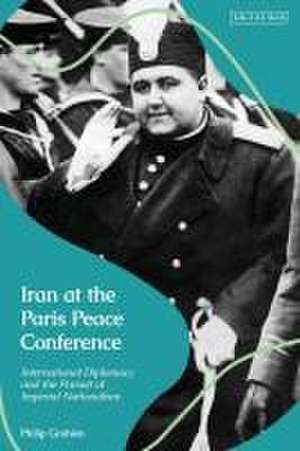Iran at the Paris Peace Conference: International Diplomacy and the Pursuit of Imperial Nationalism
Autor Philip Grobienen Limba Engleză Hardback – 24 iul 2024
Preț: 510.60 lei
Preț vechi: 731.31 lei
-30% Nou
Puncte Express: 766
Preț estimativ în valută:
97.72€ • 101.64$ • 80.67£
97.72€ • 101.64$ • 80.67£
Carte tipărită la comandă
Livrare economică 15-29 aprilie
Preluare comenzi: 021 569.72.76
Specificații
ISBN-13: 9780755651856
ISBN-10: 0755651855
Pagini: 240
Dimensiuni: 156 x 234 x 21 mm
Greutate: 0.51 kg
Editura: Bloomsbury Publishing
Colecția I.B.Tauris
Locul publicării:London, United Kingdom
ISBN-10: 0755651855
Pagini: 240
Dimensiuni: 156 x 234 x 21 mm
Greutate: 0.51 kg
Editura: Bloomsbury Publishing
Colecția I.B.Tauris
Locul publicării:London, United Kingdom
Caracteristici
Uses Persian primary sources (archives, collective works, newspapers and diary sources) and British sources (diplomatic correspondence and memoranda) to present a picture of Iran's aims and results at the Paris peace conference
Notă biografică
Philip Grobien holds a PhD from the University of St Andrews. His published work to date reflects his interest in the development of Iran's territorial nationalism during the Qajar dynasty.
Cuprins
Prologue: The Paris Peace Conference Acknowledgements Transliteration and Dates AbbreviationsList of maps Introduction: Iran at the crossroads Conceptualizing Iran's Outlook Imperial Nationalism Paris: Policies and personalities Historiography and sources Chapter 1: The nineteenth century, the Great Game and the squeezing of Iran Encounters and the advent of Russian confrontation Britain: a symbolic toe in the water Economic hegemony and the Qajar playbook Chapter 2: An Enlightenment Intellectual inheritance Direct action More contemporary foundations Occupation and war The question of International law Chapter 3: A new dawn Iran and the preparation for peaceThe delegation Foreign reaction to Iran's delegation and plans The delegation goes to Paris Chapter 4: Springtime in Paris January and February March and April Controlling the narrative Chapter 5: The cauterisation of independence May The Triumvirate The Anglo-Persian Agreement June, July and August Criticism of the agreement Chapter 6: The persistence of Nosrat al-Dowleh Nosrat al-Dowleh Countering the narrative Squaring the circle Round twoRussia and the endgameConclusion: A reassessmentNotesAppendixBibliographyIndex
